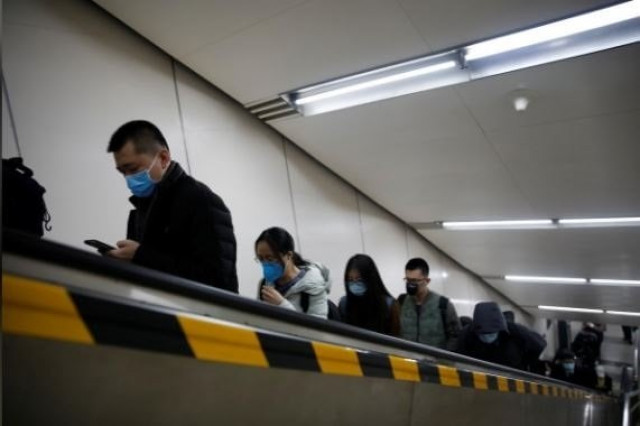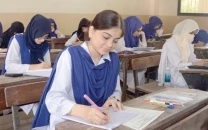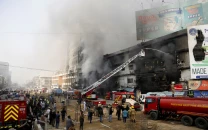China beat Covid-19 through struggle, unity
Deputy head of Chinese mission shares details of successful preventive and control measures

People wearing masks ride an escalator as they exit a subway station. PHOTO: REUTERS
“Covid-19 caught us all by surprise from the very beginning, but China, under the strong leadership of the Communist Party, the Chinese government put the lives of its people first, ensuring confidence, unity, and struggle,” said Chinese Deputy Chief of Mission Pang Chun Xue during an online policy dialogue on "Combating Covid-19: Learning from China”.
The policy dialogue had been organised by the Sustainable Development Policy Institute (SDPI) on Thursday.
Sharing her experiences of fighting the virus which has exploded into a pandemic over the past three months, Pang said that when the virus broke out in the Hubei province, they took decisive action.
“We took some swift actions regarding the total lockdown of Hubei province, useful preventive and control measures by persuading the public to stay at home and make them socially distant,” she said, adding that the public was provided with daily essentials to ensure their cooperation and so that they could stay at home comfortably.
Pang emphasised that at the height of the epidemic, China paid attention to think tanks whose input was very important for the government and the general population.
Furthermore, she specified that the multibillion-dollar China-Pakistan Economic Corridor (CPEC) was now in a new stage which focuses on the cooperation between China and Pakistan to develop socioeconomic infrastructure, education sector, agriculture sector and also meet Sustainable Development Goals (SDGs).
SDPI Executive Director Dr Abid Qaiyum Suleri said that Pakistan’s approach to fighting this disease was largely urban-centric.
Urban dwellers have some sort of health care, but in small towns and villages, healthcare was non-existent, he lamented.
“We need to focus on villages for controlling Covid-19,” he urged.
Similarly, he added that the bilateral or multilateral institutions should discuss specific districts or advise them how to cope with the pandemic.
Yesterday, he said, Pakistan had the highest number of cases confirmed in a day, however, “we should also be mindful of the fact that there will be a third wave after the lockdown.”
This wave, he warned, will be generated by the exodus of daily wagers who are trying to return to their native villages.
Further, he said that the wheat harvest in Punjab is expected to commence in the middle of April and many migrant workers return to rural areas to work in the fields. By doing so, they will be taking the virus to the rural heartland of Pakistan.
If there was a Covid-19 outbreak in rural Pakistan, “we should expect wheat scarcity,” he cautioned.
Former Minister of State for Investment Haroon Sharif stressed the need to focus on future partnerships on human development which can lead to social and economic prosperity in the region.
Sharif, a well-known economist, said so far there was some social development under CPEC but not to the extent that is needed.
SDPI Joint Executive Director Dr Vaqar Ahmed said countries such as China, South Korea and Japan who were among the first to experience coronavirus, can now explain the various systematic approaches to lockdown and what options are available in the coming days for a gradual relaxation in lockdown, at least for some essential industries such as food and health sector.
“We need some mechanism if we want the desirable results replicated from China,” SDPI China Study Centre Director Shakeel Ahmed Ramay.
The session was moderated by SDPI Associate Research Fellow Dr Hina Aslam.
Published in The Express Tribune, April 3rd, 2020.



















COMMENTS
Comments are moderated and generally will be posted if they are on-topic and not abusive.
For more information, please see our Comments FAQ